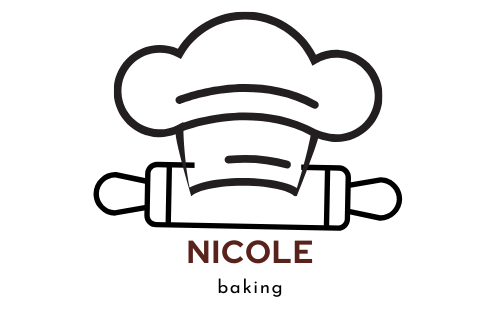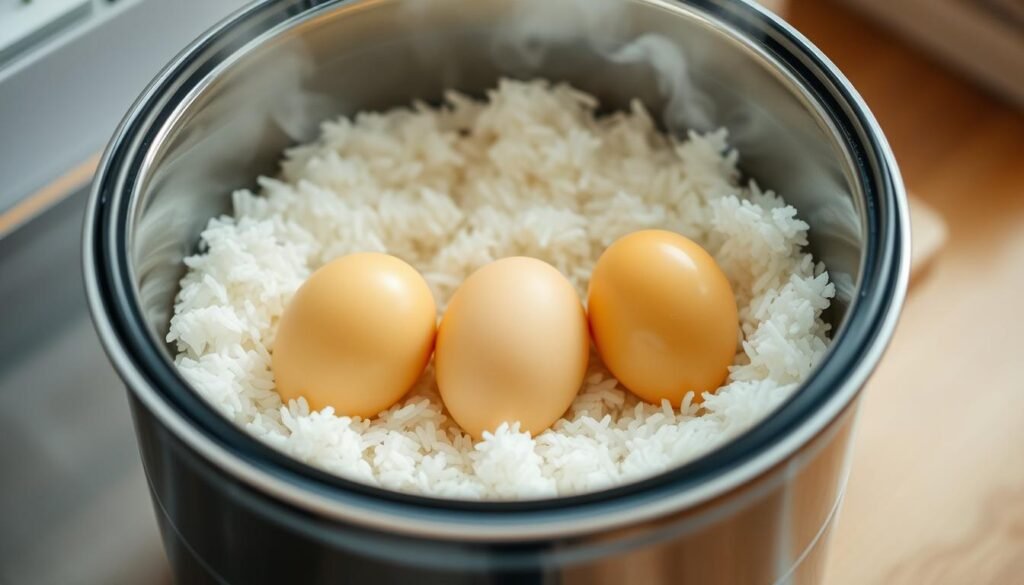
Cooking perfectly boiled eggs can be a challenge, but what if you could achieve this effortlessly? We often overlook the versatility of our kitchen appliances, but we’re about to change that.
Using a rice cooker to prepare hard boiled eggs is a game-changer. It’s a simple process that yields consistent results, making it ideal for meal prep or daily breakfast.
We’re excited to share this rice cooker recipe that simplifies cooking eggs. By the end of this article, you’ll be able to cook effortless hard boiled eggs with minimal effort.
Why Use a Rice Cooker for Hard Boiled Eggs?
The rice cooker method for hard-boiled eggs is a game-changer for those looking for a hassle-free cooking experience. This simple technique involves placing eggs in a steaming tray and letting the rice cooker do the work.
Benefits of Cooking Eggs in a Rice Cooker
Cooking eggs in a rice cooker offers several advantages. The steaming water cooks the eggs while they sit, undisturbed in the steaming tray, resulting in perfectly cooked eggs every time.
- Easy to use: Simply place the eggs in the steamer and turn on the rice cooker.
- No need to monitor: The rice cooker will automatically switch to a “keep warm” mode once the cooking is complete.
Time Efficiency
One of the significant benefits of using a rice cooker for hard-boiled eggs is the time efficiency it offers. You can cook multiple eggs at once without having to constantly monitor the cooking process.
This method is particularly useful for meal prep or when cooking for a large group.
Consistent Results
The rice cooker method ensures consistent results. The eggs are cooked evenly, and the risk of overcooking or undercooking is minimized.
- Perfect for meal prep: Get perfectly cooked eggs every time.
- Ideal for large groups: Cook multiple eggs at once with ease.
It’s so simple, you can’t NOT try this out.
Choosing the Right Rice Cooker
The journey to perfectly cooked hard-boiled eggs starts with choosing the right rice cooker. With numerous models available, understanding the key features and functionalities can make all the difference in your cooking experience.
Features to Look For
When selecting a rice cooker for boiling eggs, there are several features to consider. First, look for a model with a steam tray or a dedicated egg cooking setting. This allows for more versatile cooking options, including steaming vegetables or cooking other grains. Additionally, a digital interface can make it easier to set precise cooking times and temperatures.
Another important feature is the capacity of the rice cooker. If you plan to cook large quantities of eggs, you’ll need a larger cooker. Conversely, if you’re cooking for one or two, a smaller model will suffice. Also, consider the material of the inner pot; stainless steel or non-stick coatings can affect the ease of cleaning and the longevity of the cooker.
Recommended Brands
Some popular brands that offer reliable rice cookers suitable for boiling eggs include Instant Pot, Zojirushi, and Cuckoo. These brands are known for their quality and versatility, offering models with various features that can enhance your egg-cooking experience.
For instance, a digital rice cooker with a steam tray can be used to cook eggs to different doneness levels. You can select the Steam function and set the steam time to: 8 minutes for soft-boiled, 11 minutes for medium-boiled, and 13 minutes for hard-boiled eggs. This flexibility makes it easy to achieve your desired level of doneness.
By considering these factors and features, you can choose a rice cooker that not only makes perfect hard-boiled eggs but also serves other culinary needs. Whether you’re a busy professional or an avid cook, the right rice cooker can become a valuable addition to your kitchen arsenal.
Preparing the Eggs
The journey to perfectly cooked hard boiled eggs begins with preparing your eggs. To achieve effortless hard boiled eggs in a rice cooker, it’s crucial to start with the right preparation.
Selecting Fresh Eggs
First, we need to select fresh eggs. Fresh eggs not only taste better, but they also have a better texture after cooking. To check if an egg is fresh, you can perform a simple water test: place the egg in a bowl of water. If it sinks to the bottom and lies flat, it’s fresh. If it stands on its end or floats, it may be older.
Freshness matters because it affects how well the egg cooks and how easy it is to peel. Fresh eggs tend to have a stronger bond between the egg white and the shell, making them slightly more challenging to peel. However, the difference is minimal, and freshness is always preferred for the best flavor.
Cleaning the Eggs
Once we’ve selected our eggs, the next step is to clean them. Gently rinse the eggs under cold running water to remove any dirt or debris. This step is important because it ensures that our eggs are free from contaminants and any bacteria that might be on the surface.
To clean the eggs effectively, follow these steps:
- Gently tap on the fat end of the egg to crack it first.
- Gently tap on the sides of the egg, rolling as you go, to loosen the shell.
| Preparation Method | Ease of Peeling | Cooking Time |
|---|---|---|
| Directly in Rice Cooker | Easy | 15-20 minutes |
| Steaming Before Cooking | Very Easy | 20-25 minutes |
By following these steps, we can ensure that our eggs are properly prepared for cooking in the rice cooker, resulting in hard boiled eggs in rice cooker that are both delicious and easy to peel.
Adding Water to the Rice Cooker
Adding the right amount of water to your rice cooker is a key step in making perfect hard-boiled eggs. The water level is crucial because it directly affects the cooking process.
Ideal Water Levels
For most rice cookers, 2 cups of water is a good starting point for cooking hard-boiled eggs. However, this can vary depending on the size of your rice cooker and the number of eggs you’re cooking.
Here’s a general guideline for water levels:
| Number of Eggs | Water Level |
|---|---|
| 2-4 eggs | 2 cups |
| 5-6 eggs | 3 cups |
Alternatives to Water
While water is the most common liquid used for cooking hard-boiled eggs in a rice cooker, you can experiment with other liquids to add flavor. For example, you can use broth or stock to give your eggs a savory taste.
Some alternatives to water include:
- Chicken or vegetable broth
- Herbal infusions (e.g., with garlic or herbs)
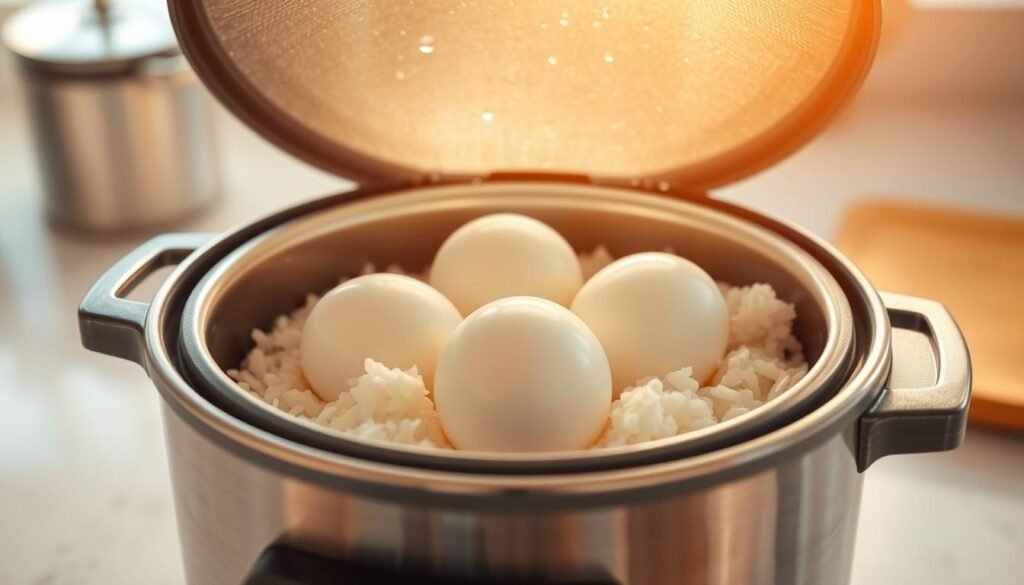
Using the right amount of water or an alternative liquid can enhance the flavor and texture of your hard-boiled eggs. Experiment with different levels and liquids to find your preferred method.
Setting Up the Rice Cooker
Configuring your rice cooker for hard-boiled eggs is easier than you think. To start, ensure you have a basic understanding of your rice cooker’s functions.
Power Settings Explained
Most rice cookers come with a simple cooking setting. For hard-boiled eggs, we typically use the COOK or RICE setting. This setting allows for a gentle heat that cooks the eggs thoroughly without overcooking them.
Some advanced rice cookers may have additional settings like porridge or slow cook. While these settings can be useful, they’re not necessary for cooking hard-boiled eggs.
Cooking Time Recommendations
To achieve perfectly cooked hard-boiled eggs, the cooking time is crucial. We recommend setting your rice cooker and timer simultaneously. For large eggs, a cooking time of 20 minutes is usually ideal for hard-cooked eggs.
- For softer yolks, you might prefer a slightly shorter cooking time.
- For very hard-boiled eggs, you can extend the cooking time by a few minutes.
By following these guidelines, you’ll be able to achieve consistently delicious hard-boiled eggs using your rice cooker.
Waiting for the Cooking Time
While the rice cooker does its magic, let’s explore what to do during the waiting time to ensure our eggs turn out perfectly. The anticipation of having effortless hard boiled eggs is exciting, and with the right approach, we can achieve consistent results.

What to Do While Waiting
As the eggs cook, you can prepare an ice bath to stop the cooking process. This step is crucial for achieving the perfect texture. Simply fill a bowl with ice and water, and once the cooking time is up, immediately transfer the eggs to this bath.
While waiting, you can also plan how you intend to use your hard boiled eggs. Whether it’s for a salad, as a snack, or as part of a breakfast dish, having a plan ensures you make the most of your cooking effort.
Importance of Timing
Timing is everything when cooking eggs in a rice cooker. The right timing ensures that your eggs are cooked to your desired level of doneness. Overcooking can make the eggs rubbery, while undercooking might leave them too raw.
To achieve the best results, it’s essential to follow the guidelines for cooking time based on your rice cooker’s specifications and your personal preference for egg doneness. Remove eggs at the appropriate time and place them immediately into a bowl of ice water to stop the cooking process.
Cooling Down the Eggs
Once the rice cooker has done its job, it’s time to stop the cooking process by cooling the eggs. This step is crucial for achieving perfectly cooked hard-boiled eggs using the rice cooker method.
Best Methods for Cooling
There are a couple of effective ways to cool down hard-boiled eggs after they’ve been cooked in a rice cooker. The most recommended method is to transfer the eggs immediately to a bowl of iced water. This rapid cooling helps in stopping the cooking process, ensuring the eggs don’t become overcooked.
- Prepare a bowl of iced water before the eggs are done cooking.
- Use a slotted spoon to gently transfer the eggs from the rice cooker to the iced water.
- Let the eggs sit in the iced water for at least 5 minutes to cool down completely.
Why Cooling is Necessary
Cooling the eggs is not just about bringing down their temperature; it’s also about making them easier to peel. When eggs are cooled rapidly, the contrast in temperature helps loosen the shell from the egg white, making the peeling process smoother.
Quick cooling also helps in preserving the texture and taste of the eggs, ensuring they remain quick hard boiled eggs that are perfectly cooked.
Peeling the Hard Boiled Eggs
Peeling hard-boiled eggs can be a challenge, but with the right techniques, it becomes effortless. After cooking your eggs to perfection in a rice cooker, the next step is to peel them. This process can be made simpler with a few helpful tips.
Tips for Easier Peeling
To make peeling easier, start by tapping the egg gently on a hard surface to crack the shell. Then, roll the egg between your hands to loosen the shell further. Tap on the fat end of the egg to crack it first, as this is usually where the air pocket is, making it easier to start peeling.
Another technique is to peel the eggs under cold running water. The water helps to loosen the shell from the egg, making the peeling process smoother.
Using Vinegar or Baking Soda
Adding certain ingredients to the water when cooking eggs can make peeling easier. Adding ½ teaspoon of baking soda to the water before closing the lid can help loosen the shells, making them easier to peel. Alternatively, you can add a tablespoon of vinegar to the water for a similar effect.
| Method | Description | Effectiveness |
|---|---|---|
| Tapping and Rolling | Crack the egg and roll it to loosen the shell | High |
| Peeling Under Water | Peel the egg under cold running water | Very High |
| Using Baking Soda | Add ½ teaspoon of baking soda to the cooking water | High |
| Using Vinegar | Add a tablespoon of vinegar to the cooking water | High |
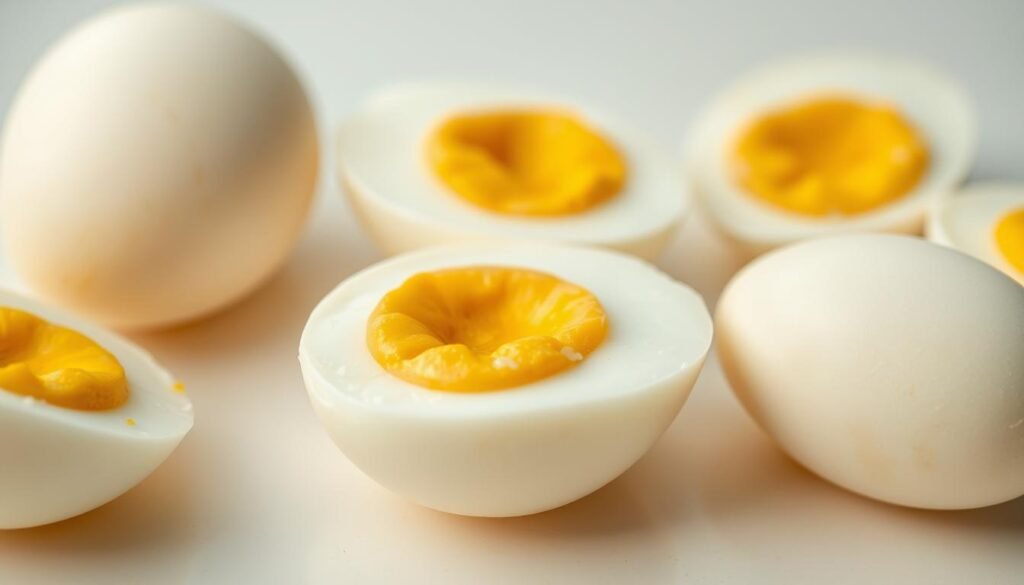
By incorporating these tips into your routine, you’ll find that peeling hard-boiled eggs becomes a much simpler task. Whether you’re making a snack or preparing for a meal, these techniques will help you achieve perfectly peeled eggs every time.
Storing Hard Boiled Eggs
Once you’ve cooked your eggs to perfection, it’s time to think about storage. Properly storing hard-boiled eggs is crucial to maintain their freshness and safety for consumption.
Best Practices for Storage
To store hard-boiled eggs, it’s essential to keep them cool and dry. We recommend storing them in a covered container in the refrigerator. You can store them with or without their shells, but keeping the shells on can help maintain moisture.
Cool and Dry Environment: The refrigerator is the ideal place, as it maintains a consistent cool temperature.
Container Storage: Use a container that is airtight to prevent moisture from accumulating.
Shelf Life Considerations
The shelf life of hard-boiled eggs depends on several factors, including storage conditions and whether they’re peeled or not. Generally, hard-boiled eggs can last up to a week in the refrigerator.
- If stored properly in a sealed container, hard-boiled eggs can last up to 7 days.
- If peeled, it’s best to consume them within 3 to 5 days for optimal freshness.
By following these storage tips, you can enjoy your effortless hard boiled eggs for a longer period while maintaining their quality.
Recipe Ideas with Hard Boiled Eggs
Now that you’ve mastered cooking hard boiled eggs in your rice cooker, let’s explore some delicious recipe ideas. Hard boiled eggs are a staple ingredient that can be used in a variety of dishes, from breakfast to snacks and appetizers.
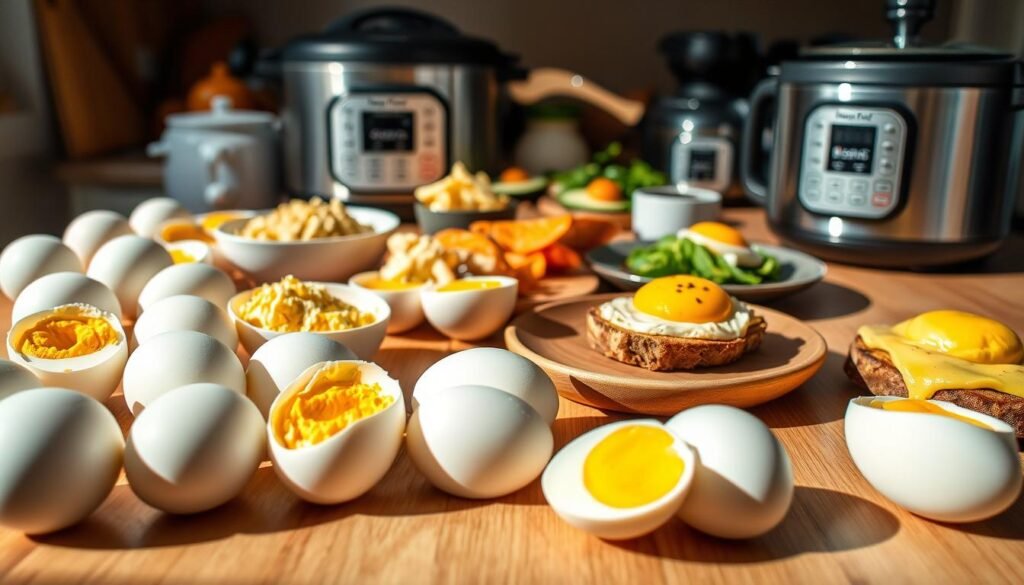
Breakfast Ideas
Starting your day with a protein-packed breakfast is easy when you have hard boiled eggs on hand. Try making egg salad with chopped hard boiled eggs, mayonnaise, and diced vegetables, and serve it on whole-grain toast or as a filling in a breakfast burrito. You can also slice hard boiled eggs and add them to a breakfast sandwich or wrap for a quick and easy meal.
Another great breakfast idea is to make a breakfast bowl with hard boiled eggs, quinoa, and roasted vegetables. Simply chop the hard boiled eggs and combine them with cooked quinoa, roasted sweet potatoes, and your favorite vegetables, and top with a fried egg or a dollop of yogurt.
Snacks and Appetizers
Hard boiled eggs are also a great snack or appetizer when you’re looking for something protein-rich and easy to grab on the go. Try making deviled eggs by filling hard boiled egg halves with a mixture of yolk, mayonnaise, and mustard, and garnishing with paprika or chives.
You can also use hard boiled eggs to make a delicious egg and avocado toast. Simply mash avocado and spread it on toast, top with sliced hard boiled eggs, and sprinkle with salt and pepper to taste. This is a great snack or appetizer that’s both healthy and flavorful.
Using your rice cooker to make quick hard boiled eggs opens up a world of possibilities for cooking hard boiled eggs in creative and delicious ways. Experiment with different seasonings and ingredients to find your new favorite recipe.
Troubleshooting Common Issues
While making hard-boiled eggs in a rice cooker is relatively straightforward, some common issues can arise. To achieve perfect results, it’s essential to be aware of these potential problems and know how to address them.
Overcooked Eggs
Overcooking can result in eggs with chalky, tough yolks. To avoid this, ensure you’re not cooking the eggs for too long. The ideal cooking time may vary depending on the rice cooker model and the size of the eggs.
Tips to prevent overcooking:
- Use a timer to keep track of the cooking time.
- Check the eggs after the minimum recommended cooking time.
- Adjust the cooking time based on the egg size and desired doneness.
Undercooked Eggs
Undercooking can lead to eggs with runny or undercooked whites. To prevent this, make sure the eggs are cooked for a sufficient amount of time. The cooking time will depend on the rice cooker and the egg size.
Tips to prevent undercooking:
- Ensure the water level is adequate to cover the eggs.
- Use the right power setting for your rice cooker.
- Check the eggs after the recommended cooking time and adjust as needed.
| Issue | Cause | Solution |
|---|---|---|
| Overcooked Eggs | Too long cooking time | Adjust cooking time, check eggs after minimum recommended time |
| Undercooked Eggs | Insufficient cooking time or water level | Ensure adequate water level, adjust cooking time, check eggs after recommended time |
By being aware of these common issues and following the tips provided, you can achieve perfectly cooked hard-boiled eggs using your rice cooker. Whether you’re making a batch for a snack or preparing ingredients for a recipe, troubleshooting these issues will help you get the best results.
Final Thoughts on Cooking Eggs in a Rice Cooker
Cooking hard boiled eggs in a rice cooker is a game-changer for anyone looking for effortless hard boiled eggs. We’ve explored the benefits of using a rice cooker, from time efficiency to consistent results, and we’ve walked through the simple steps to achieve perfectly cooked eggs.
Simplifying Your Kitchen Routine
By incorporating a rice cooker into your kitchen routine, you can enjoy hard boiled eggs in rice cooker without the hassle of traditional cooking methods. This method is not only convenient but also ensures that your eggs are cooked to perfection every time.
Give It a Try
We encourage you to give cooking eggs in rice cooker a try. You will be amazed how easy it is. Simply follow the steps outlined in this article, and you’ll be enjoying perfectly cooked hard boiled eggs in no time. Share your experience with us and let us know how it goes!
